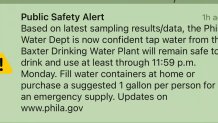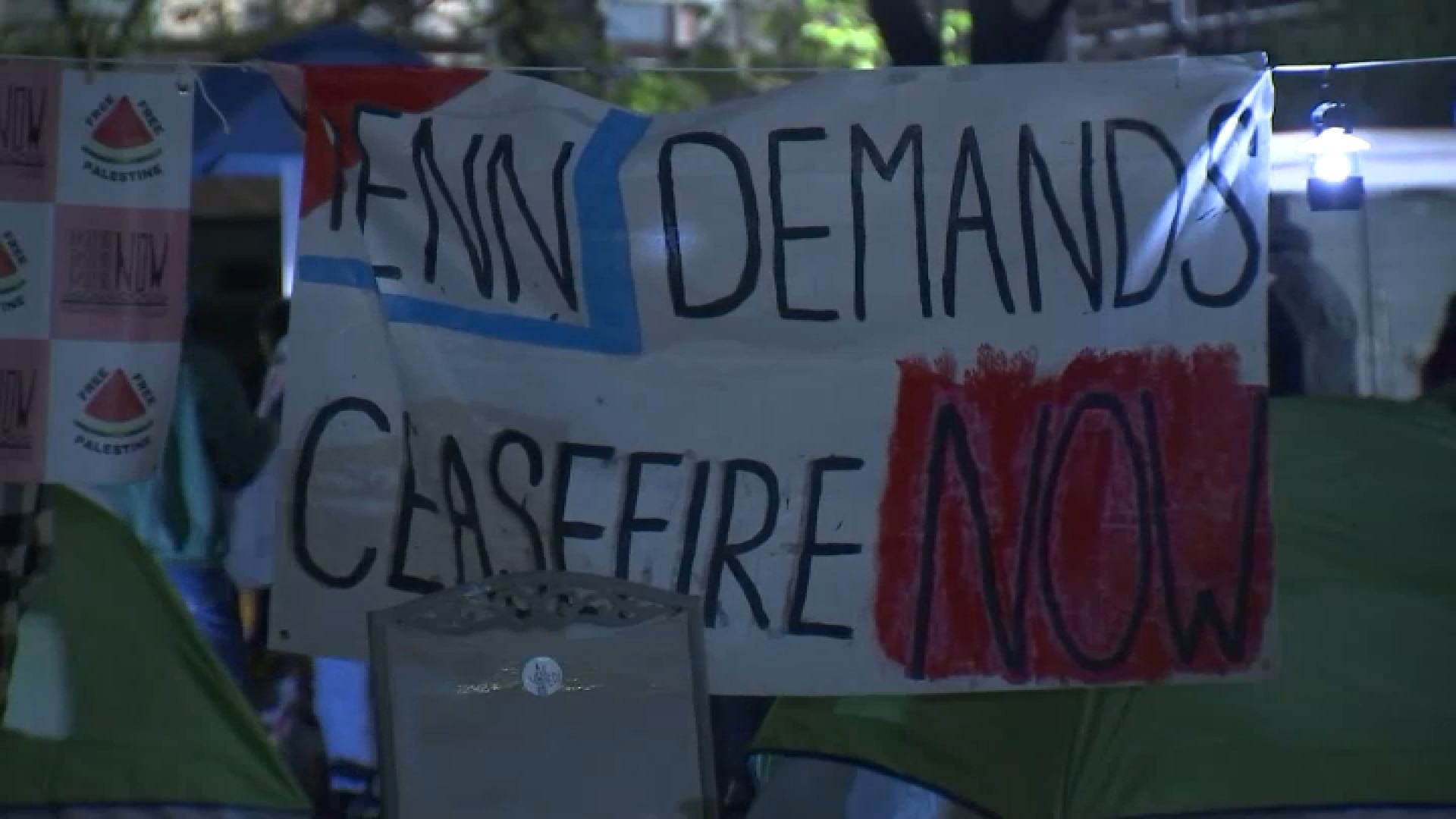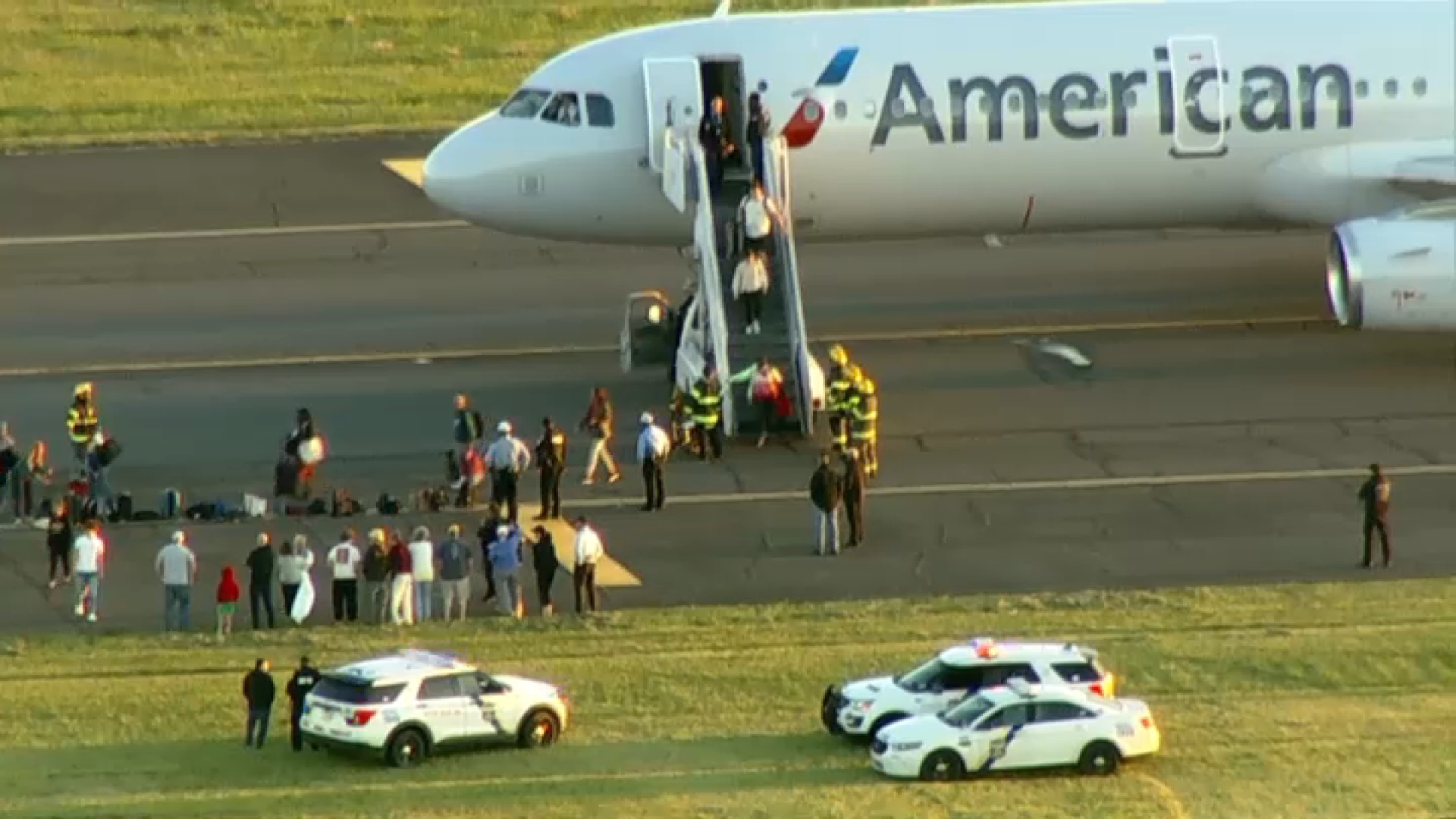What to Know
- The Philadelphia Water Department said in an update Sunday evening that water “will remain safe to drink and use” at least through Monday, based on the time it takes water to move through treatment and water mains before reaching customers.
- Bucks County health officials said Sunday that a leak late Friday evening at the Trinseo Altuglas chemical facility in Bristol Township spilled between 8,100 and 12,000 gallons of a water-based latex finishing solution into the river. Officials said it is non-toxic to humans and no known adverse health effects have been reported in the county.
- "There was contamination in the Delaware River, but we shut off the intake to the River and we're operating off of water that was not contaminated," Michael Carroll, deputy managing director for Philadelphia's Office of Transportation, said. "When we opened the intake, we were able to verify that we brought in water that was not contaminated. So currently there is no contamination in the Philadelphia system."
Editor's Note (March 27, 2023, 2:40 p.m.): The city reiterated Monday afternoon that tap water was "safe to drink and use" through the end of the night. However, they were working on a water distribution plan -- if needed. This story is no longer being updated. Click here for the latest.
Tap water in Philadelphia is safe to drink at least through midnight on Monday, March 27, after a chemical spill into the Delaware River that happened in neighboring Bristol Township, Bucks County, officials at the Philadelphia Water Department claim.
Get Philly local news, weather forecasts, sports and entertainment stories to your inbox. Sign up for NBC Philadelphia newsletters.
The latest guidance came after an earlier warning caused confusion and sent many scrambling to buy bottled water.
Sunday evening, the department provided an update to claim that there is no need to buy bottled water.
In fact, Philly residents can fill bottles or pitchers with tap water with no risk at this time, according to officials.
Local
Breaking news and the stories that matter to your neighborhood.
"The water that is currently available to customers was treated before the spill reached Philadelphia and remains safe to drink and use for bathing, cooking, and washing," the water department said.
The earlier advisory that customers received from the Baxter Drinking Water Treatment Plant said residents may choose to drink bottled water on March 26.
Officials said this was issued out of an abundance of caution.
Officials 'Confident' Water Not Contaminated
Representatives from Philadelphia's Water Department and Office of Emergency Management initially said Sunday morning that locals 'may not wish to drink or cook with tap water,' that afternoon as there could be minute traces of chemicals in the water supply, due to the spill.
However, in an update Sunday evening, officials said they were "confident" that tap water was not contaminated.
"I want to reiterate there was never any contamination in Philadelphia Water Department's system," Michael Carroll, deputy managing director for Philadelphia's Office of Transportation, said. "There was contamination in the Delaware River, but we shut off the intake to the River and we're operating off of water that was not contaminated. When we opened the intake, we were able to verify that we brought in water that was not contaminated. So currently there is no contamination in the Philadelphia system."
This updated guidance was based on the time it will take the river water that entered the water treatment plant early Sunday morning to move through the treatment and water mains before it reaches customers.

The water that was available to customers Sunday was treated before the spill reached Philadelphia and remains safe, officials said.
More water will be taken into the water treatment plan Sunday night and that water will be tested. The public will be made aware if any contamination is found, Carroll said.
Also, on Monday, public health officials in Delaware said tap water there was not impacted by the Bristol spill.
“Delaware’s drinking water has not been impacted by the spill in Pennsylvania,” said the state's Division of Public Health interim director, Rick Hong, in a statement. “Unlike neighboring states, water treatment facilities that service Delaware do not take in water directly from the Delaware River. There is no impact to Delawareans at this time. We continue to monitor the situation with our water treatment facilities and the Department of Natural Resources and Environmental Control.”
A Scramble for Bottled Water
The latest alert came after an early text message alert sent people in Philadelphia and beyond scrambling to stores, buying bottled water. Long lines could be seen at some grocery stores.
New Jersey American Water released a statement reassuring its customers that treated water from its Delaware River Regional Water Treatment Plant is not impacted by the chemical spill.
A voluntary water conservation notice has been issued for customers in Burlington, Camden and Gloucester counties.
“We’re asking customers to voluntarily reduce their unnecessary water usage for the next 24 to 48 hours to help us in our ability to maintain optimal operations and a plentiful supply for the region," Mark McDonough, President of New Jersey American Water said.
At stores in Philadelphia and South Jersey, shoppers were greeted with signs that said bottled water was sold out.
"It's crazy, in Deptford - at Sam's -- it was astronomical there was lines either side of that store. It was awful," Christine Wood, a shopper in New Jersey, said.
What Caused Contamination Concern?
According to officials, this situation arose after the Coast Guard monitored the release of a "water soluble acrylic polymer solution" into Otter Creek -- a tributary to the Delaware River -- in Bristol after a notification shortly after 11:30 p.m. on Friday.
For a map of areas impacted by the chemical spill, click here.
The Coast Guard estimated about 8,100 gallons of this latex finishing material was released when, officials said, a pipe burst at Trinseo, a chemical plant in Bristol.
Carroll said that they have been evaluating the incident since they became aware of the spill, are monitoring the situation and are continually doing testing.
"I want to reiterate that the health risks are very low, if present at all and would be long term in nature," said Carroll.
There should be no concern over skin exposure or fire hazard, he said, noting that officials believe bathing and showering in this water is safe.
In a statement, Aqua Pennsylvania said the company "immediately shut down the intake" system in Bristol and, believes this quick action may have prevented chemicals from entering drinking water.
The company said it is working with state and federal agencies and monitoring the situation. Aqua Pennsylvania said it will only reopen the intake system "when we are confident that the source water is safe for our customers and meets our stringent quality standards," the statement said.
For its part, Trinseo said, in a statement, that the chemical is "highly water soluble" and dissipated quickly after the spill. The company claims it has not detected the chemical in any water samples "collected at designated locations."
The company also said it has "paused all production" at its Bristol facility, which employs over 100 people. It plans to resume production "within the next several days" following an internal review process.
Anyone with concerns or questions about the situation should check PWD's website, officials said.
Sign up for our Breaking newsletter to get the most urgent news stories in your inbox.



